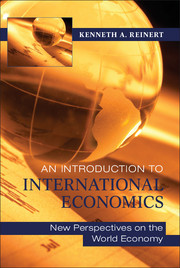Book contents
- Frontmatter
- Summary Contents
- Detailed Contents
- Preface
- Acknowledgments
- Acronyms
- Symbols
- 1 Windows on the World Economy
- I International Trade
- 2 Absolute Advantage
- 3 Comparative Advantage
- 4 Intra-Industry Trade
- 5 The Political Economy of Trade
- 6 Trade Policy Analysis
- 7 The World Trade Organization
- 8 Preferential Trade Agreements
- II International Production
- III International Finance
- IV International Development
- Glossary
- Index
- References
2 - Absolute Advantage
from I - International Trade
- Frontmatter
- Summary Contents
- Detailed Contents
- Preface
- Acknowledgments
- Acronyms
- Symbols
- 1 Windows on the World Economy
- I International Trade
- 2 Absolute Advantage
- 3 Comparative Advantage
- 4 Intra-Industry Trade
- 5 The Political Economy of Trade
- 6 Trade Policy Analysis
- 7 The World Trade Organization
- 8 Preferential Trade Agreements
- II International Production
- III International Finance
- IV International Development
- Glossary
- Index
- References
Summary
Throughout most of the 1980s, Vietnam imported rice. In 1989, however, Vietnam exported more than 1 million tons of rice. In the 1990s, its annual rice exports increased to more than 3 million tons. Despite a fall in rice exports in 2004, Vietnam was expected to export 6 million tons of rice in 2009. As discussed in Goldin and Reinert (2007, Chapter 3) and Heo and Doanh (2009), despite being the staple consumption crop in Vietnam, the expansion of rice exports helped to alleviate poverty in that country through increased employment and wage income. This beneficial increase in rice exports represents one important aspect of Vietnam's entry into the world economy through the process of trade expansion we discussed in Chapter 1.
Why does a country export or import a particular good? This chapter takes a first step in helping you answer this fundamental question by utilizing a framework that should be familiar to you from your introductory economics class: the supply and demand diagram. We will use this diagram to illustrate an important concept in international economics, that of absolute advantage. Absolute advantage refers to the possibility that, due to differences in supply conditions, one country can produce a product at a lower price than another country. In this chapter, we consider the product rice and the fact that Vietnam can produce rice more cheaply than Japan. This situation causees rice to be exported from Vietnam to Japan. It also involves what international economists call the gains from trade, which benefit both Vietnam and Japan. These gains are what motivate countries to take part in trading relationships.
- Type
- Chapter
- Information
- An Introduction to International EconomicsNew Perspectives on the World Economy, pp. 19 - 32Publisher: Cambridge University PressPrint publication year: 2011



